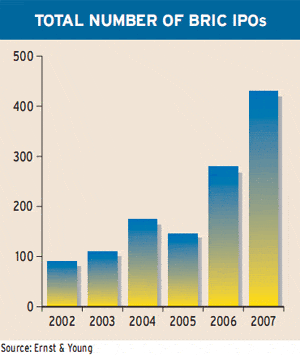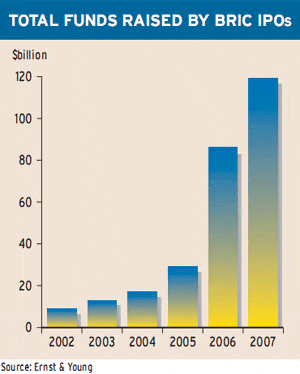GLOBAL EQUITY/DRS
Strange as it may seem, there have been bigger initial public offerings since the credit crunch hit, but fewer of them. Global IPO activity reached an all-time high of $287 billion in proceeds in 2007 but has slowed considerably amid the economic uncertainty and tumultuous markets this year.
The big emerging market countries of Brazil, Russia, India and China (BRIC) have maintained their market share, while developed markets as a whole saw a decline in both deal volume and proceeds, according to a review of the first half of 2008 by Greenwich, Connecticut-based Renaissance Capital, an independent research firm.
Looking at global IPOs with at least $100 million in proceeds, the study found that 93 new issues raised $70 billion in the first six months of 2008, compared with 269 issues and $115 billion in proceeds in the same period a year earlier. The totals do not include special purpose acquisition companies or closed-end funds.
Risk Appetite Wanes
The IPO market has witnessed a decline this year in the number of small IPOs, as investors have been less willing to take on the risk associated with less-mature companies. “One of the more noticeable trends in global IPO activity during the first half of 2008 was the drop-off in activity in some of the world’s largest markets, as investors were unwilling to buy small, speculative IPOs, and only showed interest in larger companies with exceptionally strong fundamental stories,” according to Renaissance Capital.
Total IPO proceeds in the United States increased 4% to $23 billion during the first half of this year, but the record $17.9 billion IPO by Visa accounted for much of the total. JPMorgan and Goldman Sachs were lead underwriters of the Visa IPO.
The London-based markets, which raised $23.5 billion in the first half of 2007 from 42 IPOs, registered a decline in proceeds to $6.6 billion from 13 IPOs in the first half of 2008. Britain lost market share to exchanges in the Middle East and Asia, where economic expansion supported an increase in energy and infrastructure IPOs, Renaissance Capital says. Saudi Arabia was second to the US in IPO proceeds in the first half, with $6.8 billion in proceeds from eight offerings. Alinma Bank was the largest Saudi IPO at $2.8 billion.
Middle East Stands Out
The Middle East region has shown some resilience as a result of liquidity created on the back of higher oil prices, says Phil Gandier, head of transaction advisory services for Ernst & Young Middle East. “My expectations for the rest of the year remain optimistic due to the large number of announced and to-be-announced IPOs,” he says.
Saudi Arabian Mining, or Maaden, the kingdom’s biggest gold producer, raised $2.5 billion in an IPO in July, which was designed to raise capital for expansion, as the company moves into phosphate mining and other activities.
The BRIC countries (including Hong Kong) produced 72 IPOs that raised $30.5 billion in the first half of 2007, according to Renaissance Capital. In this year’s first half, the same countries had 26 new listings, with $20.7 billion in proceeds. Four of the five largest IPOs in the first half of 2008 were from emerging markets.
In the largest IPO outside of the US during the first half, China Railway Construction raised $5.5 billion in an offering split between Hong Kong and Shanghai. Brazilian oil and gas exploration and production company OGX raised $4.1 billion in the country’s largest-ever IPO. Reliance Power raised $3 billion in India’s biggest IPO.
Africa was another region that gained market share in the first six months of 2008, according to Renaissance Capital. Kenya, Morocco, Nigeria and Zambia each had one IPO, for a total of $1.3 billion for the continent, up from $357 million in the same period a year earlier.

Big Deals in Pipeline
Despite the slowdown in global IPO volume in the first half, the pipeline for future offerings remains strong, with several deals of $1 billion and larger planned, Renaissance Capital says. China’s biggest homebuilder, CSEC, expects to raise $6 billion. Australia-based Global Switch, which operates data centers, plans a $3 billion IPO. Russian search engine and web portal Yandex is scheduled to raise $2 billion.
As Global Finance went to press, China South Locomotive and Rolling Stock, the country’s largest train manufacturer, began an IPO that was seeking to raise a total of $1.5 billion in an offering split between Shanghai and Hong Kong.
The slower pace of global IPOs in the first half of 2008 continued during the normally lethargic summer months. July was the slowest month for IPOs worldwide in five years, with $5.6 billion in proceeds from 47 IPOs, down from $31.7 billion raised from 190 IPOs in July 2007, according to Dealogic. Latin America had no IPOs in July 2008, as regional markets were hit by falling commodity prices and rising interest rates in Brazil. In July 2007 there were 18 Latin American IPOs.

Waiting for Better Markets
Trends in IPO activity can be difficult to predict, especially in times of market volatility, Ernst & Young cautioned in a report released in June. “However, companies around the world continue to ready themselves to go public while waiting for market conditions to improve,” the report says.
Achieving global IPO prominence for the first time, Brazil became the third-largest IPO market in the world in 2007, according to Ernst & Young. Some 64 companies worth $27 billion tapped the Brazilian public markets last year, with nearly all of them listing on Bovespa, the São Paulo stock exchange. Bovespa itself went public last year and raised $3.2 billion in what was then the country’s largest IPO.
In the first quarter of this year, however, Brazil’s IPO markets ground to a halt, largely in response to global market volatility amid uncertainty about the impact of the US subprime mortgage crisis and global credit crunch, says Paolo Sergio Dortas, IPO leader for strategic growth markets at Ernst & Young South America. Virtually all Brazilian companies withdrew or postponed their planned issuances.
Role of Foreign Investors
Having purchased more than two-thirds of all local Brazilian share offerings, foreign institutional investors were the driving force behind Brazil’s stock market boom, Dortas says. Rising commodity prices and Brazil’s solid economic growth, with gross domestic product growing at a 5.4% pace last year, propelled the market. In early May Standard & Poor’s raised Brazil’s sovereign debt rating to investment grade. Until June, when the market fell 10.4%, Brazil’s Bovespa was the best performing among the world’s 20 biggest markets, with a rise of 14% for the year to date.
Mining magnate Eike Batista timed the IPO for his Brazilian oil and gas company, OGX, to nearly coincide with the market’s peak. The IPO also followed reports of a massive oil find off Brazil’s coast. OGX last year won exploration rights to offshore oil and gas blocks with estimated reserves of 4.8 billion barrels, although the company had never drilled a well. However, Batista hired key executives with experience at Petrobras, the state-owned oil firm, and this inspired the confidence of investors. UBS, Credit Suisse and Banco Itaú were the lead underwriters for the IPO.
Vale’s Record Share Sale
On July 13 Companhia Vale do Rio Doce, or Vale, the world’s biggest iron-ore producer, raised $11.5 billion in a secondary share offering that included $3.88 billion of American depositary receipts. Credit Suisse managed the share sale, in which international investors could choose to receive ADRs listed on the New York Stock Exchange.
The Vale offering to fund acquisitions and organic growth was reduced from an originally announced $14 billion, as a decline in oil and commodity prices hurt investor demand, but it was still the biggest-ever share offering by a Brazilian company. Meanwhile, the Bovespa stock index continued to fall, as foreign investors became net sellers, fearing a peak in the commodity cycle.
The collapse of the Doha Round world trade talks at the end of July raised concern that Brazil would fail to win new markets for its agricultural exports, including sugar, coffee, oranges and soybeans. The Bovespa stock index hit a six-month low in early August, after declining 24% from its record high in May.
Brazil Remains Attractive
William Kirst, head of JPMorgan’s Latin America depositary receipts business, says, “Brazil will remain a primary focus for our efforts in the region, despite the ups and downs in the market.” He notes that JPMorgan is the depositary for Petrobras and Vale, two of the most actively traded US-listed DRs. “Those programs continue to have vibrant activity,” he says.
Effective August 4, JPMorgan was selected as successor depositary for the ADR program of Banco Santander Chile, that country’s largest bank. Last year JPMorgan launched a global depositary share program for Grupo Clarín, the first Argentina-based company to have a DR listing on the London Stock Exchange. The bank also introduced a global depositary receipt program for Almacenes Exito, which was the first primary offering of shares by a Colombian company outside of its home market in more than a decade.
“We are actively talking with companies throughout the region, and the pipeline for new ADR issues looks very good,” Kirst says. “Whether they come to market in the year-end period or early in 2009 will be tied to market conditions.”
Globally, demand for the ADR has increased because more investors see the benefits of this investment vehicle, Kirst says. “There will be more ADR-related structures for companies planning IPOs, as well as a growing pool of investors,” he says.
Gordon Platt



